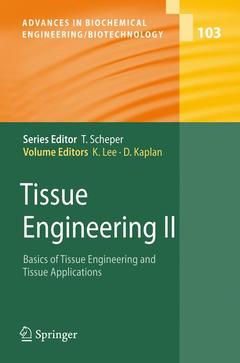Description
Tissue Engineering II, Softcover reprint of hardcover 1st ed. 2007
Basics of Tissue Engineering and Tissue Applications
Advances in Biochemical Engineering/Biotechnology Series, Vol. 103
Coordinators: Lee Kyongbum, Kaplan David L.
Language: English
Subjects for Tissue Engineering II:
Tissue Engineering II
Publication date: 11-2010
336 p. · 15.5x23.5 cm · Paperback
Publication date: 11-2010
336 p. · 15.5x23.5 cm · Paperback
Tissue engineering II: Basics of tissue engineering and tissue applications (Advances in biochemical engineering, Biotechnology, Vol. 103)
Publication date: 11-2006
336 p. · 15.5x23.5 cm · Hardback
Publication date: 11-2006
336 p. · 15.5x23.5 cm · Hardback
Description
/li>Contents
/li>Comment
/li>
It is our pleasure to present this special volume on tissue engineering in the series Advances in Biochemical Engineering and Biotechnology. Thisvolume re?ects the emergence of tissue engineering as a core discipline of modern biomedical engineering, and recognizes the growing synergies between the technological developments in biotechnology and biomedicine. Along this vein, the focusof thisvolume istoprovide abiotechnology driven perspective on cell engineering fundamentals while highlighting their signi?cance in p- ducing functional tissues. Our aim is to present an overview of the state of the art of a selection of these technologies, punctuated with current applications in the research and development of cell-based therapies for human disease. To prepare this volume, we have solicited contributions from leaders and experts in their respective ?elds, ranging from biomaterials and bioreactors to gene delivery and metabolic engineering. Particular emphasis was placed on including reviews that discuss various aspects of the biochemical p- cesses underlying cell function, such as signaling, growth, differentiation, and communication. The reviews of research topics cover two main areas: cel- lar and non-cellular components and assembly; evaluation and optimization of tissue function; and integrated reactor or implant system development for research and clinical applications. Many of the reviews illustrate how bioche- cal engineering methods are used to produce and characterize novel materials (e. g. genetically engineered natural polymers, synthetic scaffolds with ce- type speci?c attachment sites or inductive factors), whose unique properties enable increased levels of control over tissue development and architecture.
R.J. Fisher, R. A. Peattie: Controlling Tissue Microenvironments: Biomimetics, Transport Phenomena and Reacting Systems.- R.A. Peattie, R.J. Fisher: Perfusion Effects and Hydrodynamics.- J.P. Acker: Biopreservation of Cells and Engineeried Tissues.- V.L. Tsang, S.N. Bhatia: Fabrication of Three-Dimensional Tissues.- J.A. Garlick: Engineering Skin to Study Human Disease - Tissue Models for Cancer Biology and Wound Repair.- S.T. Andreadis: Gene Modified Tissue Engineered Skin: The Next Generation of Skin Substitutes.- T.J. Webster, E.S. Ahn: Nano-Structured Biomaterials for Tissue Engineering Bone.- Y. Nahmias, F. Berthiaume, M.L. Yarmush: Integration of Technologies for Hepatic Tissue Engineering.-
Covers trends in modern biotechnology
All aspects of this interdisciplinary technology, where knowledge, methods and expertise are required from chemistry, biochemistry, microbiology, genetics, chemical engineering and computer science, are treated
More information as well as the electronic version available at springer.com
© 2024 LAVOISIER S.A.S.




